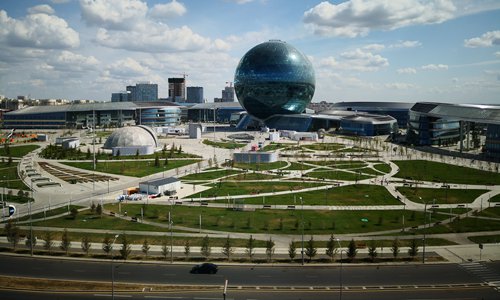
The 2017 Expo site in Nur-Sultan. (Photo: Global Times)
Central Asian wine may not be well known to Chinese customers, but that isn't stopping Arba Wine, one of the biggest wine makers in Kazakhstan, from selling its products to China this year for the first time.
This year's volume to China is only 20,000 bottles, which are expected to reach Shanghai before October. But while proudly showing the company's huge cellar stacked with barrels and brewing machines, the company's owner Zeinulla Kakimzhanov vowed to increase that number to 200,000 bottles in five years.
He is not worried about competition with prominent European and "New World" breweries, as he believes the Chinese market is large enough to accommodate a variety of enterprises.
"There are 200 million 'rich' people in China who will want to consume wine, more than European and US (wine consumers) combined!" Kakimzhanov told the Global Times at his brewery near Almaty, the largest city in Kazakhstan.
Currently, his wine is transported by truck, crossing the border into Xinjiang in Northwest China and traveling to Shanghai on the east coast in five days.
Arba Wine's bright prospects are just one of numerous success stories involving Kazakh enterprises doing business with China. The consumer market is booming, and particularly importantly, well-developed land and air transport routes between the two countries make cross-border cargo delivery very convenient, helping Kazakhs tap the huge potential of the Chinese market.
Transport routes are vital for enterprises in Kazakhstan, the world's largest land-locked country. They have given the country an increasingly important role in international transport and communications, partly thanks to its willingness to embrace the Belt and Road Initiative.
Situated at the heart of Eurasia and bridging the vibrant economies in East Asia and Europe, infrastructure construction and transportation projects in Kazakhstan have steadily improved connectivity both within and outside the country.
Chinese President Xi Jinping in September 2013 first raised the concept of a "Silk Road Economic Belt" at a speech in Nazarbayev University during his visit to Kazakhstan. The Silk Road Economic Belt, together with the later proposed "21st Century Maritime Silk Road," became China's flagship Belt and Road Initiative, which was aimed at boosting international connectivity of infrastructure for cargo and personnel exchanges.
More than 2,000 years ago, Chinese products, mainly silk, were transported from the ancient capital Chang'an westward via Gansu and Xinjiang to what is now Kazakhstan and all the way to Europe at its furthest. The ancient trade route included the southern part of Kazakhstan.


